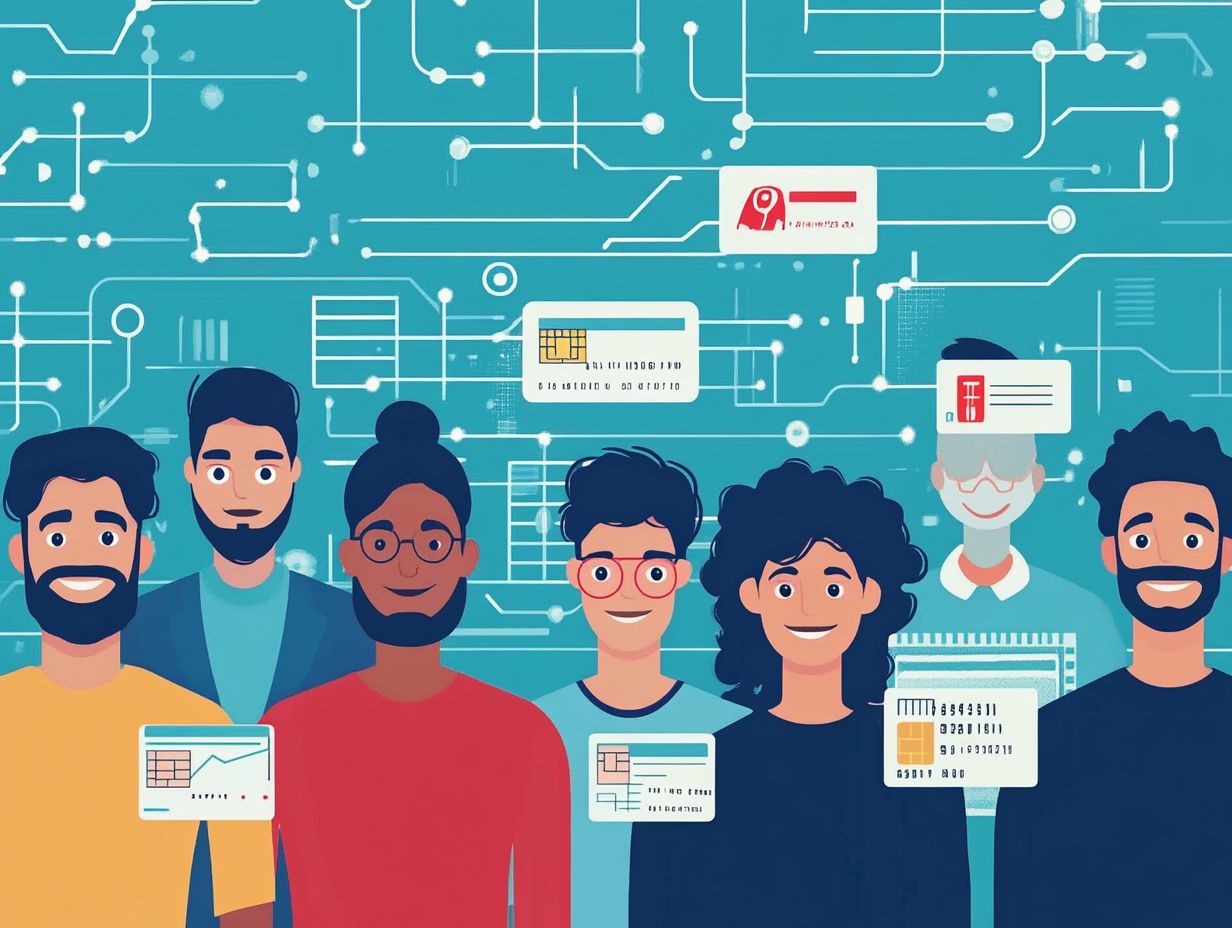Understanding 6 Types of Identity Theft
Identity theft is an escalating concern in today s digital landscape, impacting millions worldwide.
From financial fraud to wrong medical information, the methods by which personal identities can be exploited are varied and, frankly, unsettling.
This article delves into six prevalent forms of identity theft, including financial, medical, and synthetic theft, each carrying distinct implications.
It outlines effective strategies to protect yourself, actions to take if you become a victim, and ways to monitor and recover your identity.
Arm yourself with the knowledge necessary to remain safe and informed.
Contents
- Key Takeaways:
- 1. Financial Identity Theft
- 2. Medical Identity Theft
- 3. Child Identity Theft
- 4. Criminal Identity Theft
- 5. Synthetic Identity Theft
- 6. Identity Cloning
- What Are the Most Common Ways Identities Are Stolen?
- Frequently Asked Questions
- What is identity theft and why is it important to understand the different types?
- What are the 6 types of identity theft?
- What is financial identity theft and how does it occur?
- How does medical identity theft happen and what are the consequences?
- What is child identity theft and how can it be prevented?
- What is the difference between criminal identity theft and synthetic identity theft?
Key Takeaways:

Financial identity theft leads to lost money and ruined credit.
Medical identity theft can result in incorrect treatments and financial strain.
Child identity theft remains hidden for years, affecting credit in the future.
1. Financial Identity Theft
Financial identity theft is a pervasive issue that can affect you and your family. It often results in unauthorized transactions, damaged credit scores, and significant emotional distress.
If you become a victim, your personal information could be misused to open fraudulent accounts or rack up debts. Understanding the different types of identity theft and taking proactive steps to protect yourself is crucial.
This crime often begins with the theft of crucial data, such as Social Security numbers, profoundly impacting your financial identity and credit reports.
By identifying the warning signs early and utilizing identity theft protection services, you can mitigate risks and work towards recovery.
Criminals frequently employ various methods, like phishing emails and data breaches, to gain access to sensitive information. Phishing attacks can trick you into revealing personal details, often disguised as legitimate communications from your bank or service providers.
Data breaches at large organizations can expose millions of records, leaving countless individuals vulnerable. The emotional toll can be overwhelming; if you find yourself impacted, you may experience anxiety over financial instability and the lengthy resolution process.
To safeguard your interests, you must:
- Regularly monitor your credit reports.
- Set up fraud alerts with credit bureaus.
- Consider identity theft protection services.
By taking these steps, you can proactively defend against potential misuse of your information.
2. Medical Identity Theft
Medical identity theft is an increasingly concerning trend where your personal information is misused without your consent to access healthcare services or insurance benefits.
This issue is escalating and leads to inaccuracies in your medical history, causing erroneous billing and insurance claims. You may find yourself facing denied coverage for legitimate services and confusion over unexpected bills.
To combat this, it s essential for you to take proactive steps to protect your sensitive information. Employ strong passwords and be discerning about sharing personal details.
Staying aware of your healthcare interactions and checking your medical records regularly is vital in a landscape where deception can have profound repercussions.
3. Child Identity Theft
Child identity theft is a concerning form of identity fraud that involves the unauthorized use of a child’s personal information. This often leads to long-term financial repercussions and challenges establishing a clean financial identity as they mature.
This exploitation typically arises when criminals access Social Security numbers, using them to open credit accounts or apply for loans all under the child’s name.
The consequences can be crippling; victims may struggle to apply for college loans or obtain their first credit card, creating a cycle of mistrust with financial institutions.
You must remain vigilant, recognizing the importance of closely monitoring your child’s personal information. By utilizing credit monitoring services and teaching your children about privacy, you can better protect against these threats and ensure a secure financial future for your loved ones.
You must take steps to protect your identity now. Don t wait until it s too late!
4. Criminal Identity Theft
Criminal identity theft occurs when someone misuses your personal information to commit a crime. This thrusts you into a whirlwind of legal troubles and wrongful accusations that can deeply impact your life and reputation.
This type of fraud can lead to wrongful arrests, forcing you to navigate the often convoluted legal system to prove your innocence. Law enforcement may erroneously link you to criminal activities based solely on the misuse of your identity. The result can be emotional distress, jeopardizing both your personal and professional relationships.
To tackle this serious issue, gather all relevant documentation and promptly report the crime to the authorities. Reach out to credit reporting agencies, implement fraud alerts notifications that help protect your identity and consider identity theft protection services. These measures empower you to reclaim your identity and rebuild your reputation.
5. Synthetic Identity Theft

Synthetic identity theft is a sophisticated crime where criminals craft a new identity by blending real and fake personal information. This often results in fraudulent accounts and significant financial fraud, all without a clear victim initially in sight.
This deception complicates efforts of financial institutions, making it challenging to trace fraudulent activities back to the actual perpetrators. The repercussions extend beyond just banks and credit companies; you may face damaged credit scores or the misuse of your personal data.
Recognizing the signs of synthetic identity theft is essential for your protection. Look out for unexplained charges, unfamiliar credit lines, or sudden spikes in credit activity these could be red flags.
Credit monitoring services are your best allies in this fight. They offer alerts and protective measures against fraudulent behaviors and assist you in reporting any suspicious activity to the appropriate authorities.
6. Identity Cloning
Identity cloning is an insidious form of identity theft. Here, someone’s personal information is duplicated to construct a false profile, leading to unauthorized transactions and a host of challenges for the individual whose identity has been compromised.
This crime typically involves collecting sensitive data through various means, such as phishing emails, data breaches when unauthorized individuals access sensitive information or social engineering tactics. The consequences for victims can be devastating, resulting in financial losses and long-lasting repercussions on their credit scores and personal reputation.
In today s digital landscape, it is essential to remain vigilant. Set up fraud alerts and actively monitor your financial activity to significantly bolster your defenses.
By taking these proactive measures, you can help protect your identity and mitigate potential damages posed by this growing threat. Start monitoring your accounts today to safeguard your identity!
What Are the Most Common Ways Identities Are Stolen?
Understanding the common ways identities are stolen is essential in today s tech-driven landscape. Cyber threats loom large, and personal information is perpetually at risk of compromise through various channels.
- Phishing scams cleverly bait you into revealing sensitive information by posing as trustworthy sources.
- Data breaches unveil a treasure trove of personal data from companies you thought were secure.
- Social engineering tactics play on your emotions to extract private information.
- Physical theft, whether it s someone snatching your wallet or grabbing your devices, remains alarmingly effective for identity theft.
By staying informed about these tactics, you can take proactive measures to protect your identity. Utilize strong passwords, exercise caution in online interactions, and regularly monitor your credit reports to swiftly catch any unauthorized activities.
How Can You Protect Yourself from Identity Theft?
Protecting yourself from identity theft demands a proactive approach. Implement strong protection methods, set up fraud alerts, and routinely monitor your personal information and financial accounts for any suspicious activity.
One essential strategy is to use strong, unique passwords for each of your accounts. This can effectively thwart unauthorized access.
Exercising caution when sharing personal information, particularly on social media, is crucial for maintaining your privacy.
Regularly checking your credit reports is a smart move that can save you from potential headaches! Consider using credit monitoring services to track financial transactions and alert you to unusual activity.
By following these strategies, you can significantly reduce the risk of falling victim to identity theft, ensuring better security for your personal and financial information.
What Are the Steps to Take If You Become a Victim of Identity Theft?
If you find yourself a victim of identity theft, it s crucial to act swiftly and methodically to limit further damage. Start by documenting the fraud and disputing any unauthorized transactions on your credit reports.
Next, report the theft to local law enforcement. Having an official report will be vital for any future disputes with creditors or institutions.
After that, reach out to your financial institutions. They can assist you in freezing accounts and preventing any additional charges.
Don t forget to contact credit bureaus to place a fraud alert on your credit file. This makes it significantly harder for thieves to open new accounts under your name.
Seeking identity theft recovery services can also be a smart move. They provide expert guidance to navigate the recovery process effectively.
Throughout these steps, keep meticulous documentation of all actions taken dates, names of representatives spoken to, and outcomes. This record will prove invaluable in resolving issues and ultimately reclaiming your identity.
How Can You Monitor Your Identity for Suspicious Activity?

Monitoring your identity for suspicious activity is essential for safeguarding your personal information. You can effectively achieve this through a range of identity monitoring services that alert you to any unusual financial behavior.
These services typically include credit monitoring, which provides real-time alerts about changes to your credit report, such as new accounts opened in your name or fluctuations in your credit score.
Many of these services also offer notifications for unauthorized transactions, ensuring that any fraudulent activity is swiftly addressed.
Regularly reviewing your credit reports is also crucial. This enables you to spot discrepancies or potential fraud early on and take swift corrective action when necessary.
By leveraging these tools, you can maintain a vigilant stance in protecting your financial well-being.
What Are the Legal Consequences of Identity Theft?
The legal ramifications of identity theft are severe, affecting not just the victims but also the perpetrators. Those found guilty may face serious penalties, including heavy fines or prison time.
Victims are often left to navigate the aftermath, wrestling with the complexities of the legal system to reclaim their identities and recover financial losses.
Seeking justice involves several critical steps, such as:
- Filing police reports
- Collaborating with credit agencies to dispute fraudulent charges
Engaging with legal professionals can be invaluable. They offer essential guidance through the intricate process of reclaiming your life and ensuring that you receive any available restitution.
How Can You Recover from Identity Theft and Restore Your Identity?
Recovering from identity theft demands a comprehensive strategy that incorporates identity theft services, disputing inaccuracies on your credit reports, and taking decisive steps to restore your financial identity.
One of the first moves in this journey is to reach out to the major credit bureaus and place a fraud alert on your accounts. This simple act can serve as a crucial safeguard against further unauthorized activities.
Next, you should regularly check your credit reports for any unfamiliar transactions or changes. Staying informed is vital.
If you uncover any discrepancies, act quickly to dispute them. Provide the necessary documentation to back up your claims. Bringing legal professionals into the fold can offer valuable guidance as you navigate the complexities of recovery.
Be patient and persistent in your recovery efforts. Rebuilding trust and stability takes time, but your efforts will pay off in the end.
Frequently Asked Questions
What is identity theft and why is it important to understand the different types?
Identity theft is a serious crime where someone steals your personal information, such as your name, Social Security number, or credit card number, to use it for their own gain. Understanding the different types of identity theft is important so you can take the necessary precautions to protect yourself and your personal information.
What are the 6 types of identity theft?

The six types of identity theft are financial identity theft, medical identity theft, child identity theft, criminal identity theft, synthetic identity theft, and identity cloning.
What is financial identity theft and how does it occur?
Financial identity theft occurs when someone uses your personal information to make unauthorized transactions or open accounts in your name. This can happen through stolen credit card information, phishing scams, or data breaches.
How does medical identity theft happen and what are the consequences?
Medical identity theft occurs when someone uses your personal information to receive medical treatment or services. This results in fraudulent charges and potential harm to your medical records. It can happen through stolen health insurance information or someone posing as you at a medical facility.
What is child identity theft and how can it be prevented?
Child identity theft is when someone uses a child’s personal information to open accounts or apply for loans. This can often go undetected for years and can have serious consequences for the child’s credit and financial future. Parents can prevent this by monitoring their child’s personal information and teaching them about online safety.
What is the difference between criminal identity theft and synthetic identity theft?
Criminal identity theft occurs when someone uses your personal information while committing a crime. Synthetic identity theft involves creating a new, false identity using a mix of real and fake information. Both types can have serious legal and financial consequences for the victim.
Don t wait! Start monitoring your identity today!





